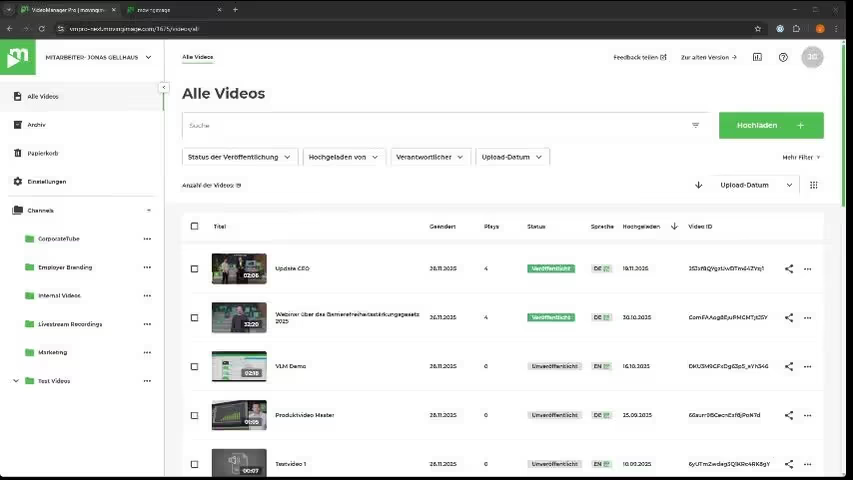Sustainability in virtual and hybrid events: our tips for eco-conscious planning

Driving your success with video

Sustainability in virtual and hybrid events: our tips for eco-conscious planning
The golden rule for more sustainable virtual events: reduce, reuse, replenish
Whether for online or offline events—or any other area of life—the rule of thumb for sustainability is simple: reduce, reuse, replenish.
So at every stage of your event planning process, ask yourself: What resources can be avoided, reused, or compensated?
What you can reduce
Choosing to host a virtual event already eliminates a significant number of emissions. For example, it cuts down on travel for attendees, service providers, and other participants.
Virtual events also offer greater flexibility and accessibility. According to a survey by EventMB, 88% of respondents said that the ability to attend a hybrid event allowed them to better manage their time and participate remotely.
Integrating virtual elements into your event can also greatly expand your audience. A study by Tagoras found that 70% of organizers saw an increase in both reach and attendance through hybrid formats.
Hosting a virtual event significantly reduces your carbon footprint by eliminating the need for large venues and catering. In fact, for a one-hour event with 300 participants, you can save around 8.1 tons of CO₂. That’s a reduction of up to 95% compared to a fully in-person event.
And even with online events, you can do more to cut resource usage. For example:
- Use video conferencing platforms with a lower carbon footprint to reduce energy consumption. (You’ll find more energy-saving tips later in this article)
- Rely on digital collaboration tools instead of sending dozens of emails with people in CC.
- If you do need service providers, choose local partners to reduce transport-related emissions.
Avoid sending printed materials—offering a downloadable flyer on your website is far more sustainable.
What you can reuse
Yes—even in online events, there are plenty of things you can reuse. For example:
- Digital graphics
- Physical backdrops for your “stage”—while not always fully reusable, they can often be easily adapted
- Hardware used to produce and stream the event
What you can compensate
Some things simply can’t be avoided or reused—but they can be offset. Tree-planting and environmental compensation programs are excellent ways to do this. You’ll find such initiatives not only from cloud service providers and web hosting companies, but also from travel and logistics providers.
Of course, it’s unrealistic to eliminate every impact—unless you skip the event entirely (which isn’t the goal). The aim is to host an unforgettable online event that’s as sustainable as possible.
Lower power consumption and use green energy
Electricity use is unavoidable—but it can be reduced. That’s not only good for the planet, but also for your budget. It’s worth knowing which tools and platforms have the lowest carbon footprint.
One key point is to be mindful with video usage. Video streaming and live connections require far more energy than audio alone—on average, video triples the CO₂ impact.
To run your event sustainably, consider green energy providers like Naturstrom, EWS, or Greenpeace Energy. This ensures your event is powered by 100% renewable electricity. The same principle applies to your office or home office setup as well.
Sustainable hardware
It’s also essential to rely on sustainable hardware. It plays a significant role in making your online event more environmentally friendly. But what exactly does “sustainable hardware” mean?
Sustainable hardware refers to devices like computers, smartphones, tablets, and cameras that are particularly energy-efficient. It’s also helpful if the batteries are replaceable—this extends the lifespan of the device and reduces the need for new purchases.
Even better: if you only need certain devices occasionally, rent instead of buy.
And if buying is the better option, consider choosing secondhand products to minimize environmental impact.
Conclusion
Online events are now a vital part of modern business culture—and that’s a good thing. They offer a real opportunity to reduce environmental impact. By choosing resource-efficient solutions and focusing on energy reduction, you can make a tangible contribution to sustainability.
There’s also a strong marketing upside—after all, who wouldn’t want to attend an event that’s innovative, engaging, and environmentally responsible?
Looking for a partner to help you run your virtual or hybrid events more sustainably We’d love to hear from you—get in touch with us today!
Our Speakers
The golden rule for more sustainable virtual events: reduce, reuse, replenish
Whether for online or offline events—or any other area of life—the rule of thumb for sustainability is simple: reduce, reuse, replenish.
So at every stage of your event planning process, ask yourself: What resources can be avoided, reused, or compensated?
What you can reduce
Choosing to host a virtual event already eliminates a significant number of emissions. For example, it cuts down on travel for attendees, service providers, and other participants.
Virtual events also offer greater flexibility and accessibility. According to a survey by EventMB, 88% of respondents said that the ability to attend a hybrid event allowed them to better manage their time and participate remotely.
Integrating virtual elements into your event can also greatly expand your audience. A study by Tagoras found that 70% of organizers saw an increase in both reach and attendance through hybrid formats.
Hosting a virtual event significantly reduces your carbon footprint by eliminating the need for large venues and catering. In fact, for a one-hour event with 300 participants, you can save around 8.1 tons of CO₂. That’s a reduction of up to 95% compared to a fully in-person event.
And even with online events, you can do more to cut resource usage. For example:
- Use video conferencing platforms with a lower carbon footprint to reduce energy consumption. (You’ll find more energy-saving tips later in this article)
- Rely on digital collaboration tools instead of sending dozens of emails with people in CC.
- If you do need service providers, choose local partners to reduce transport-related emissions.
Avoid sending printed materials—offering a downloadable flyer on your website is far more sustainable.
What you can reuse
Yes—even in online events, there are plenty of things you can reuse. For example:
- Digital graphics
- Physical backdrops for your “stage”—while not always fully reusable, they can often be easily adapted
- Hardware used to produce and stream the event
What you can compensate
Some things simply can’t be avoided or reused—but they can be offset. Tree-planting and environmental compensation programs are excellent ways to do this. You’ll find such initiatives not only from cloud service providers and web hosting companies, but also from travel and logistics providers.
Of course, it’s unrealistic to eliminate every impact—unless you skip the event entirely (which isn’t the goal). The aim is to host an unforgettable online event that’s as sustainable as possible.
Lower power consumption and use green energy
Electricity use is unavoidable—but it can be reduced. That’s not only good for the planet, but also for your budget. It’s worth knowing which tools and platforms have the lowest carbon footprint.
One key point is to be mindful with video usage. Video streaming and live connections require far more energy than audio alone—on average, video triples the CO₂ impact.
To run your event sustainably, consider green energy providers like Naturstrom, EWS, or Greenpeace Energy. This ensures your event is powered by 100% renewable electricity. The same principle applies to your office or home office setup as well.
Sustainable hardware
It’s also essential to rely on sustainable hardware. It plays a significant role in making your online event more environmentally friendly. But what exactly does “sustainable hardware” mean?
Sustainable hardware refers to devices like computers, smartphones, tablets, and cameras that are particularly energy-efficient. It’s also helpful if the batteries are replaceable—this extends the lifespan of the device and reduces the need for new purchases.
Even better: if you only need certain devices occasionally, rent instead of buy.
And if buying is the better option, consider choosing secondhand products to minimize environmental impact.
Conclusion
Online events are now a vital part of modern business culture—and that’s a good thing. They offer a real opportunity to reduce environmental impact. By choosing resource-efficient solutions and focusing on energy reduction, you can make a tangible contribution to sustainability.
There’s also a strong marketing upside—after all, who wouldn’t want to attend an event that’s innovative, engaging, and environmentally responsible?
Looking for a partner to help you run your virtual or hybrid events more sustainably We’d love to hear from you—get in touch with us today!



.avif)


.avif)






.avif)





